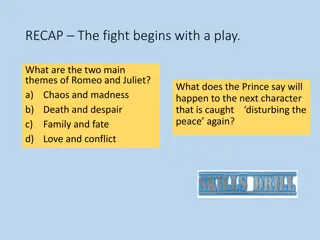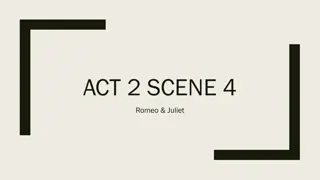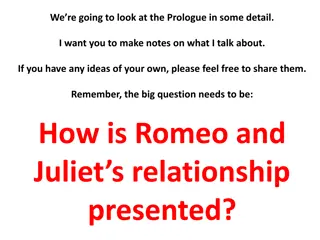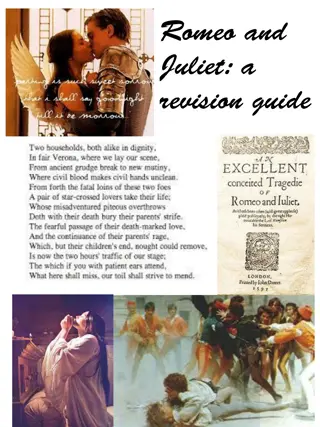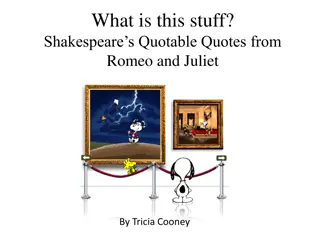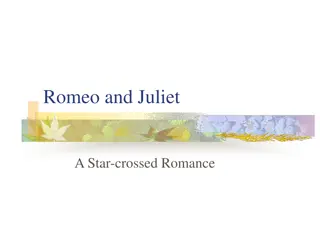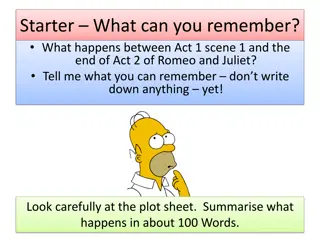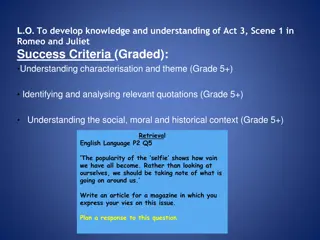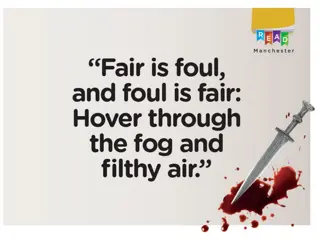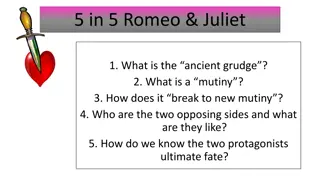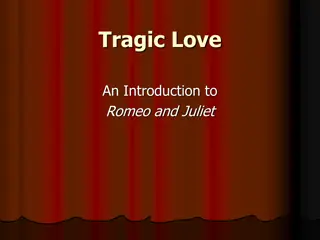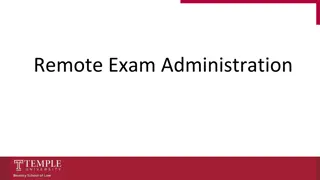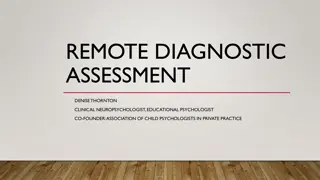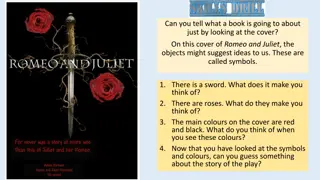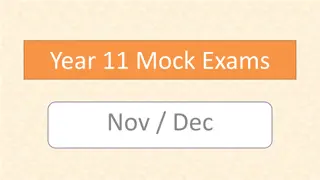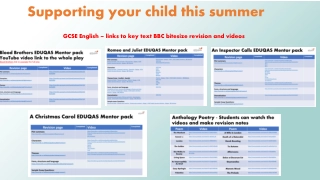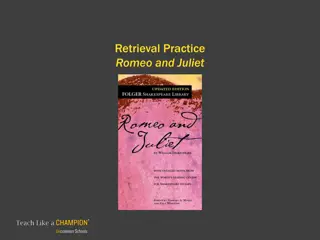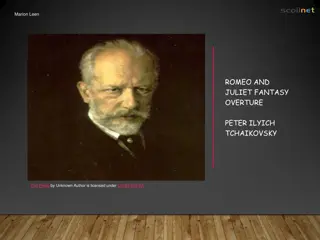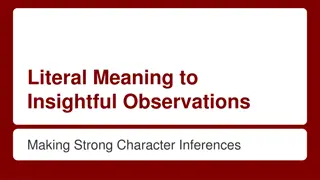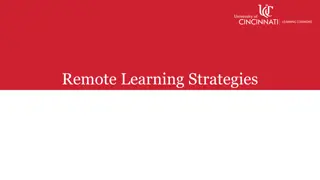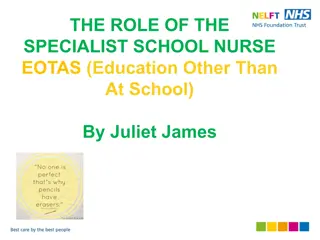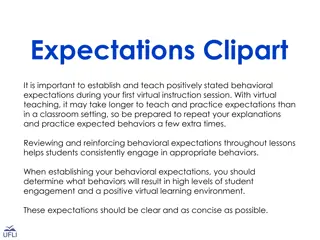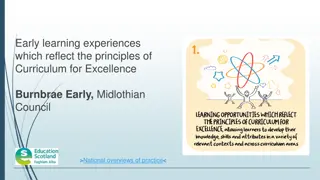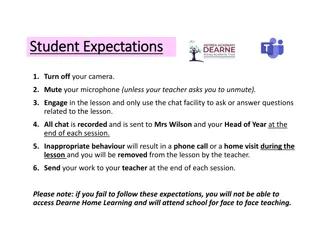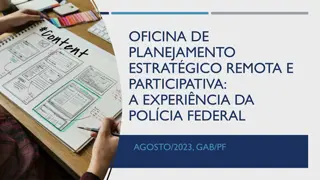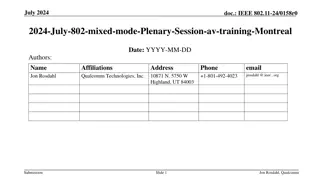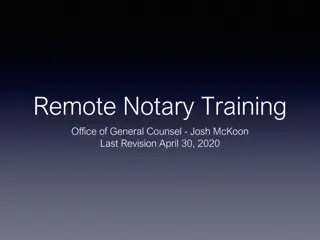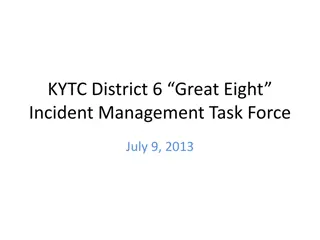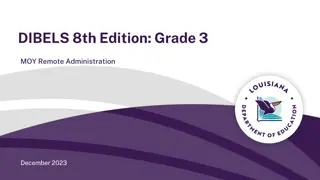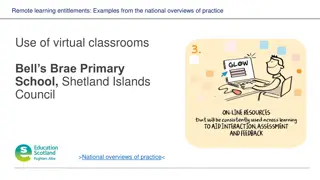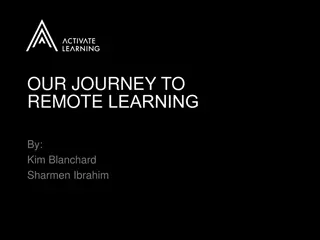Remote Learning Expectations and Romeo & Juliet Recap
Remote learning expectations for students are outlined, emphasizing engagement and appropriate behavior. Questions related to the play "Romeo and Juliet" are also addressed, focusing on themes, characters, and key events. Additionally, reflection prompts on love, hate, and unknown enemies are provided for further exploration.
Download Presentation

Please find below an Image/Link to download the presentation.
The content on the website is provided AS IS for your information and personal use only. It may not be sold, licensed, or shared on other websites without obtaining consent from the author. Download presentation by click this link. If you encounter any issues during the download, it is possible that the publisher has removed the file from their server.
E N D
Presentation Transcript
Student Expectations 1. Turn off your camera. 2. Mute your microphone (unless your teacher asks you to unmute). 3. Engage in the lesson and only use the chat facility to ask or answer questions related to the lesson. 4. All chat is recorded and is sent to Mrs Wilson and your Head of Year at the end of each session. 5. Inappropriate behaviour will result in a phone call or a home visit during the lesson and you will be removed from the lesson by the teacher. 6. Send your work to your teacher at the end of each session. Please note: if you fail to follow these expectations, you will not be able to access Dearne Home Learning and will attend school for face to face teaching.
What can you remember? Which of these details is revealed to the audience in the Prologue? A. Two foes fight to the death B. A pair of star-crossed lovers take their life What are the two central themes of Romeo and Juliet? A. Love and Conflict B. Family and the Supernatural What is the definition of melodramatic? A. A disagreement or struggle B. Exaggerated or over emotional behaviour Who is Romeo in love with at the beginning of the play? A. Rosaline B. Juliet Where does Romeo meet Juliet? A. At church B. At Lord Capulet s party Who do Lady Capulet and the Nurse want Juliet to marry? A. Paris B. Romeo Which comparison does Romeo use to describe Juliet? A. Ravishing rose B. Torch burning bright It has been clear from the start of the play that Romeo and Juliet s relationship is doomed. A. True B. False Which two characters seemed to try to stop the fight with Tybalt A. Benvolio and Mercutio B. Benvolio and Romeo Why is Romeo banished from Verona? A. For killing Tybalt B. For marrying Juliet in secret Which is an exclamatory sentence? A. I will be deaf to pleading and excuses B. And fire-eyed fury be my conduct now!
Check your answers: What are the two central themes of Romeo and Juliet? A. Love and Conflict B. Which of these details is revealed to the audience in the Prologue? A. B. A pair of star-crossed lovers take their life Who is Romeo in love with at the beginning of the play? A. Rosaline B. Which comparison does Romeo use to describe Juliet? A. B. Torch burning bright Why is Romeo banished from Verona? A. For killing Tybalt B. What is the definition of melodramatic? A. B. Exaggerated or over emotional behaviour Where does Romeo meet Juliet? A. B. At Lord Capulet s party It has been clear from the start of the play that Romeo and Juliet s relationship is doomed. A. True B. Who do Lady Capulet and the Nurse want Juliet to marry? A. Paris B. Which two characters seemed to try to stop the fight with Tybalt A. B. Benvolio and Romeo Which is an exclamatory sentence? A. B. And fire-eyed fury be my conduct now!
Consider these questions: Is it possible to love your enemy? Can you love and hate somebody at the same time? Can you hate someone you don t even know?
Recap: Put these events in the right order A. Mercutio and Tybalt are killed B. Paris asks Lord Capulet if he can marry Juliet C. Romeo and his friends decide to gatecrash the Capulet ball D. Romeo and Juliet fall in love at first sight E. Romeo and Juliet are married F. Romeo is banished G. Romeo is in love with Rosaline H. The play starts with the servants of the Capulets and Montagues fighting in the street I. The Prince orders that future fights will be punished J. Tybalt starts a fight in the street
Check your answers: A. The play starts with the servants of the Capulets and Montagues fighting in the street B. The Prince orders that future fights will be punished C. Romeo is in love with Rosaline D. Paris asks Lord Capulet if he can marry Juliet E. Romeo and his friends decide to gatecrash the Capulet ball F. Romeo and Juliet fall in love at first sight G. Romeo and Juliet are married H. Tybalt starts a fight in the street I. Mercutio and Tybalt are killed J. Romeo is banished
RECAP 1. Benvolio and Mercutio are in the street discussing the possibility of a fight when Tybalt enters looking for Romeo. 2. Romeo enters and Tybalt insults him. Having just wed Juliet, Romeo tried to keep the peace but this enrages Tybalt and Mercutio and they start fighting. 3. Romeo tries to stop the fight, but Mercutio is fatally wounded. 4. Romeo is so infuriated by Mercutio s death that he now fights with Tybalt and kills him. Romeo flees the scene. 5. The Prince learns about the fight from Benvolio and Romeo is banished from Verona.
Act 3 Scene 1 Although the background of the feud is revealed at the very outset of the play, Shakespeare gives us hope that the union of Romeo and Juliet and their marriage may mend the rift between their families. The audience believes that it is possible that all may be well. However, the fight that occurs in Act III, scene I between Mercutio and Tybalt and then between Romeo and Tybalt brings new death to the feud. Mercutio s cry of a plague on both your houses demonstrates that all will not be well. Therefore, this scene is the turning point of the play.
A plague on both your houses! Many consider this scene to be the point when the real tragedy begins. Many consider Mercutio s curse to be the point when the two lovers are doomed to die. As an audience we are supposed to feel the sense of tragedy for Mercutio who has been killed as a result of a feud he had little to do with. However Romeo also comments about the impending doom he senses: black fate Shakespeare uses the language of Revenge Tragedies of the late 1500 s in this scene to bring the feud between Capulets and Montagues to a climax. The dramatic tension has been building since Act 1 Scene 1 and now reaches its peak.
Can you remember what dramatic irony meant?
Verbal Irony This is where the words state the opposite of the writer's (or speaker's) true meaning. Prologue: "Two households, both alike in dignity, . . ." We think that the two families are dignified or honorable. We realise that each family is violently competitive - they are similarly undignified. Act 3 Scene 1: When Mercutio dies he says: 'Ask for me tomorrow, and you shall find me a grave man'. This joking makes everyone unsure if he is truly hurt.
Situational irony This where the events turn out the opposite of what was expected. What the characters and audience think ought to happen isn't what eventually happens. E.g. Romeo and Juliet end up together forever but in death instead of life.
Improving Explanations: At the end of Act 3, Scene 1, Mercutio is shown to be bitter, angry and vengeful. The audience can see this from the line, A plague o both your houses . This line shows just how angry he is that he has died. Is this a good paragraph?
Improving Explanations: At the end of Act 3, Scene 1, Mercutio is shown to be bitter, angry and vengeful. The audience can see this from the line, A plague o both your houses . This line shows just how angry he is that he has lost his life at such a young age because of the silly arguments of two families. He isn t related to either family and this makes him bitter, so in his last breath he curses them both. The curse shows that he blames Romeo for his death even though they are friends. This may be why Romeo takes revenge, as he feels responsible. Is this better?
Put this paragraph in the right order: At the beginning of Act Three, Scene One, Either you or I or both must go with him . Romeo changes from being peaceful to being aggressive and filled with feelings of revenge. Romeo is angered by Mercutio s death and is willing to risk his own life in revenge. He does not think about the consequences of what he is doing. What else does this response need?
Is this better? At the beginning of Act Three, Scene One, Romeo changes from being peaceful to being aggressive and filled with feelings of revenge. Either you or I or both must go with him . Romeo is angered by Mercutio s death and is willing to risk his own life in revenge. He does not think about the consequences of what he is doing. The fact that Romeo says both shows how out of control he is.
Dramatic irony Verbal irony Situational irony You are to judge whether this scene is the cause of the play ending as it does. Support your answer with evidence from the scene itself MERCUTIO: A plague o both your houses! ROMEO: black fate THE PROLOGUE: "Two households, both alike in dignity, . . ." MERCUTIO: Ask for me tomorrow, and you shall find me a grave man ROMEO: Either you or I or both must go with him
What knowledge have you learnt today? What skills have you learnt/developed today? How has your previous learning helped you today?



